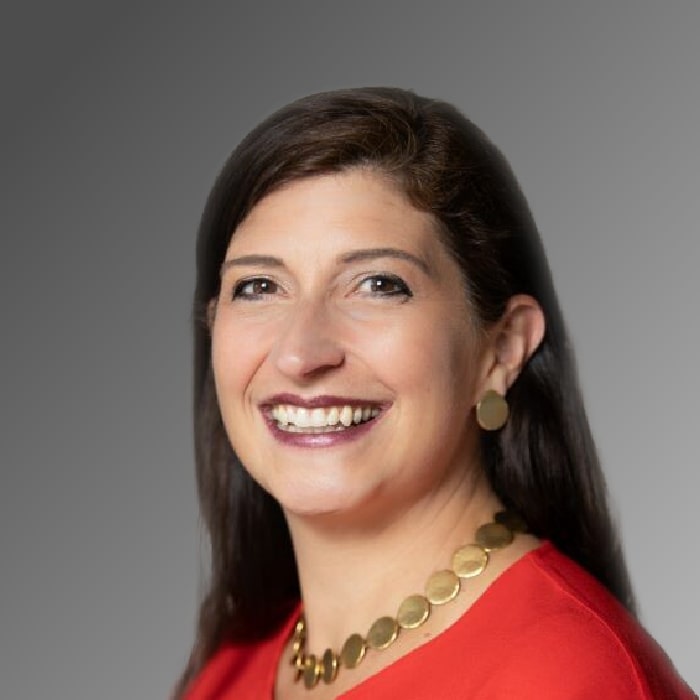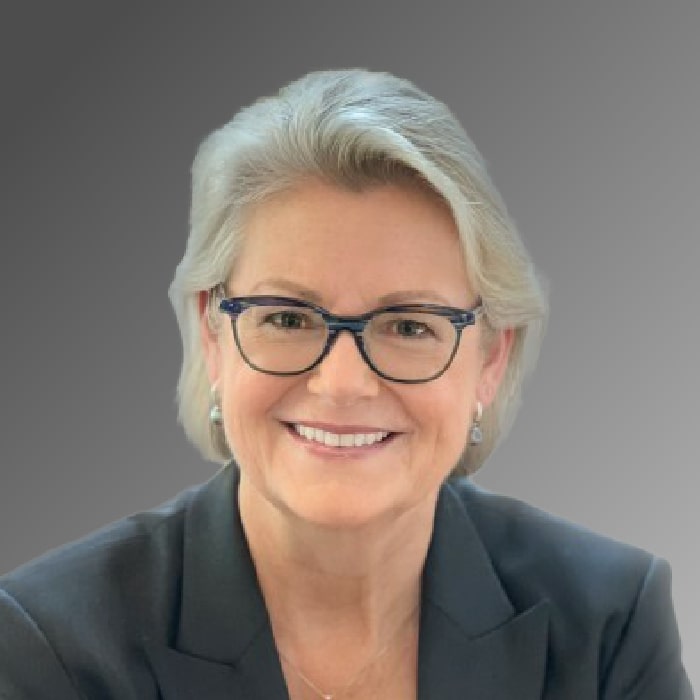Networks to Research: A Curious Glance into Health Tech
May 14, 2024
Interviewed by Nicolas Sauvage on April 28, 2022
Jessica Zeaske seemed destined for a career in academia. After earning her bachelor’s degree in psychology from Stanford and her master’s and Ph.D. in public health education and health policy management from Johns Hopkins, she was ready to settle into a life as a public health professor.
But, as she told the Corporate Venturing Insider audience and host and TDK Ventures President Nicolas Sauvage, a happy detour lay ahead that eventually would take her to today’s managing partner role at Echo Health Ventures.
Scholarly Approach to Investing
Even in the heady days of stock options and bootstrap startups that enticed many of her friends to drop out of Stanford or join basement innovators, Jessica stayed the course.
But working for a private equity firm to pay for her doctorate, she was bitten by the venture capital bug. She stayed with the company after graduation and never looked back. Jessica said the industry allows her to interact with both data and entrepreneurs. While academia and corporate venture capital may seem worlds apart, Jessica sees several similarities. Performing due diligence on potential startup investments feeds what she calls her “scientific ADHD.”
“I feel like I get to write dissertations every six months,” she said. “It’s intellectual candy. I get to learn about HIV prevention for three months, then I’m going to learn how to build a new insurance plan, and then about how claims are processed. That’s how I ended up getting hooked. It’s an academic excitement in unraveling the thread into market trends.”
Her shift carried on something of a family tradition. Jessica’s mother transitioned from education to high-tech, spending the last 23 years of her career at Oracle.
“My Ph.D. is in public health, but really on the biostatistics side. What I do every day is still in that public health world, looking at the affordability, the accessibility of healthcare for all Americans. In healthcare, you’re looking at risk as you’re looking at actuarial models. And I feel entrepreneurship is the path to achieving that, especially in this country where we need innovative payment models and new reimbursement models in the healthcare space.”
The Path to Echo Ventures
Jessica gained experience in her postdoctoral years, including writing dozens of term sheets, but she decided that to get ahead in venture investing, she needed an MBA. She chose to get hers part-time through a virtual program while continuing to work full-time.
“I think that’s a route for career professionals, especially in venture, where this is an apprenticeship, and you learn it by doing,” she said. “Leaving for two years and then coming back and trying to get a job can be tricky.”
The ties between venture capital and academia reasserted themselves as Jessica took positions in which she was responsible for spinning out medical technology companies based on intellectual property developed at the University of Minnesota and Oregon Health & Science University. Her next big move was to Lemhi Ventures, where, thanks in large part to a partnership with United Health Group, she was able to make significant, impactful investments to advance the state of healthcare.
After a brief stint with GE Ventures, Jessica landed at Echo Health Ventures, where her academic perspective and appreciation for due diligence come together.
“Public health is woven throughout my whole career,” she said. “My expertise is really narrow, especially around payers and enterprise software — the most boring topics you can imagine, but I have found you can make an impact (by) innovating around them. And I have the platform to be able to do it as a strategic healthcare investor.”
These skills come together to form Jessica’s investment philosophy and inform the constant refinement of her team’s investment thesis. She wants to be explicit in the sectors Echo Ventures will and will not consider. Erecting firm guardrails around investment topics serves the interests of startups and alliance partners alike.
Jessica constructs mid-range (three to four years) models around Echo Ventures’ five major interest areas.
“One year, we’re going to look at value-based care. Three years from now, changing the reimbursement models that are so critical in healthcare may be an investment theme,” she explained. “And then every year there are different…sector themes. That’s where we get the Echo insights through outbound calling. Sometimes, in pursuing one sector theme, you end up in an adjacent area that you weren’t expecting. But that’s the fun of doing this!”
Advisory Team Dynamics
Jessica insists that her alliance team brings industry experience to the table but acknowledges that experience can be gained in a variety of ways. Some team members build it through traditional methods. She cited a data expert who came to Echo after facilitating IBM’s corporate partners. Another came aboard after a term at Blue Cross of North Carolina.
But She also recently hired a liaison for Arkansas Blue Cross/Blue Shield who has never worked for a Blue insurance company.
“She is the former CEO of a large cardiology practice,” Jessica explained. “She knows the hospital associations and the provider community really well. She knows the Blues community because of all the work he’s done in innovation across Arkansas. So there’s a depth of knowledge.”
Jessica seeks diversity in experience, expertise, and perspective, as well. She wants a balance of introverts and extroverts, data wonks and storytellers, market gurus, and transactional mavens.
“Those are the types of teams that are going to excel,” she said. “We’ve all seen venture capital firms and private equity firms where everyone has gone to certain schools, they’ve gone to certain investment banks and then to certain funds. They don’t even look different. Their backgrounds are all the same.”
She wants diversity because it reflects healthcare and health tech’s multiple facets. Jessica said alliance members can ensure she doesn’t get caught up in an echo chamber far removed from the realities consumers face.
“It’s easy to get excited about an ivory tower innovation that’s great for people who are commercially insured or have wealth to fund their health system,” she said. “But health care doesn’t happen in South San Francisco conference rooms. It happens in rural America. It happens in the middle of Brooklyn, where someone is trying to find mental health resources they can access between their two jobs.”
She said alliance members keep the venture team focused on what frontline providers need and how local populations can get better access to affordable healthcare.
While Echo Health Ventures strives for both financial returns and strategic value, the latter is more difficult to measure. So, Jessica measures the attach rate by including portfolio company engagement with alliance members and scenarios where Echo may not have invested but can provide valuable insights and advice on maintaining relationships with existing vendors or waiting for emerging startups in a particular space to mature.
Entrepreneur Relations
Echo Ventures’ strong alliance is a big value add for entrepreneurs it engages with, as well.
“They work extremely hard with our CEOs to help them understand how to sell to a health plan,” Jessica said. “That is not an innate skill, but CEOs who want to move fast need that level of relationship with alliance partners who are also intellectually interested in developing the portfolio.”
Team members assist startup leaders with tasks such as structuring their pitch decks, roleplaying client meetings, scheduling presentations, and more.
“We do very much focus on that competitive advantage or differentiation we hope to bring,” Jessica said. “This all builds up to the relationship you’re going to have with a management and investment team. That’s another reason why you want to bring Echo Health Advisors in early. They’re going to ask questions that are relevant to the voice of the customer.”
She said it comes down to making the entrepreneurs feel respected, even, or especially when declining the investment opportunity. While recognizing the power dynamic, she emphasizes the honor of having entrepreneurs share their ideas. A respectful decline, coupled with constructive feedback, reflects Echo Health Ventures’ commitment to maintaining humility in the venture capital space.
She strives to “make sure that they’re getting a piece of feedback, that they’re understanding why (Echo declines) especially where we’ve done a lot of diligence.” She wants startup founders to know “where and how we might look at it going forward. If we’ve gone pretty far, we’ve gotten them some customer feedback.”
In some cases, the entrepreneurs may have met with representatives from alliance members who may prove to be valuable contacts, customers, or investors.
Startup founders “are the ones who are risking their careers and people’s payrolls,” Jessica said. “It is an honor to have you share your ideas with me. And thank you for taking the time. To be in a position of power and then not be respectful would be a real red flag for me.”

 Parent companies and limited partners can help entrepreneurs understand how to sell their products with pitch decks and presentations, which is essential to moving quickly. Providing this access is a key value add for CVCs.
Parent companies and limited partners can help entrepreneurs understand how to sell their products with pitch decks and presentations, which is essential to moving quickly. Providing this access is a key value add for CVCs. 

















